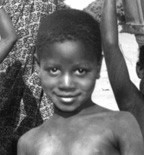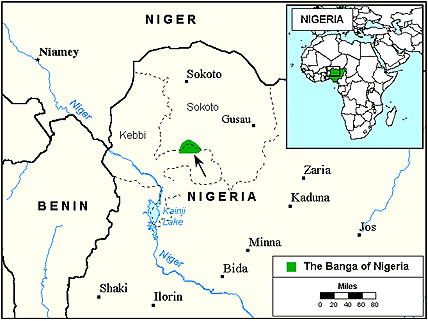The Banga Bantu live in the Sokoto Province of Nigeria. They are primarily concentrated in the Juru division of the well-watered Zuru-Donko region.
A revolt broke out around 1700 between the Zamfara and the Kebbi peoples. The Banga moved south to avoid the conflict. They formed the semi-independent Donko kingdom. In the nineteenth century, the Banga became a great fighting force as a result of persisting Fulani raids in and around Donko. They continued to resist the Fulani and Hausa.
In the early twentieth century, the British administration divided northern Nigeria into provinces and independent districts, each of which was ruled by a district chief. Because of seniority, the Donko chief was given higher status as President of the Federal Court. Banga political influence continues to this day.
Most Banga raise livestock and work on small farms. They excel at farming, using such tools as plow-hoes, axes and sickles to grow guinea corn, rice, sweet potatoes, red peppers, cotton and tobacco. The women regularly collect forest products such as locust beans, roots of certain plants, honey, peanuts, and various types of wood that are needed for food preparation, medicines, and other necessities. Hunting and fishing are also engaged in but have declined in importance in recent years.
Many of the Banga work as weavers, mat makers, potters or crafters of leather and wood. In addition, they are specialized drummers. A variety of drums and drum music are played at special events and for special people. The drummers form a prestigious group of their own.
Banga compounds consist of round huts constructed of mud walls and thatched roofs. Beds are made of mud and are raised so that a fire can burn under them during the cold weather. The compounds are kept in order, with firewood precisely stacked against the compound wall. Each compound has a gatehouse that is used to receive guests, store grain, and keep livestock during the night.
A pregnant woman must not eat certain foods, enter water for fear of evil spirits or leave her hut at midday. After the child is born, neither parent may carry it. Rather, a young nurse will only hold the baby toward the mother when the child needs to be fed. Children begin to work by age seven. They give boys small hoes and, later, weapons to take hunting with their fathers. Girls help their mothers with household duties and tend to the young children. Later, they are taught the chief art of pottery making.
Wrestling is an important sport for Banga males, and participation begins around the age of fourteen. Wrestling matches take place between villages. Each year one champion wrestler is awarded a forked stick that he will carry over his shoulder as a sign of victory.
Although some of the Banga have converted to Islam due to Hausa and Fulani influences, most still practice their traditional ethnic religion. The Banga are mainly animists (believe that non-human objects have spirits) and both men and women join various cults. They worship the spirits in rocks or trees, and men have their own personal gods. They offer prayers and sacrifices to the objects, and conduct certain rituals in conjunction with those offerings to ensure the good growth of crops, to prevent disease, etc. A "chief rainmaker" prays to the gods to send rain, and they address the supreme being, Assilus, in times of crisis.
The Banga have few Christian materials available in their language. There are a few known Banga believers. Evangelistic work and much prayer are needed to bring in a full harvest for the Lord.
Pray for the Banga people to have the spiritual hunger it takes to embrace Christ no matter what the cost.
Ask the Lord of the harvest to send dedicated laborers to work among the Banga.
Pray that God will give the Banga believers boldness to share Christ with their own people.
Ask God to raise up Banga disciples who will make more disciples.
Pray that the Banga will dream of Jesus and see visions of him.
Scripture Prayers for the Banga in Nigeria.
https://en.wikipedia.org/wiki/Benga_people
https://www.101lasttribes.com/tribes/benga.html
| Profile Source: Joshua Project |











